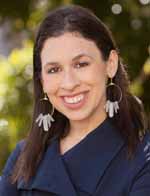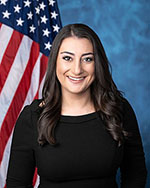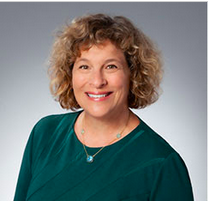By Donald H. Harrison

SAN DIEGO – Hundreds of San Diegans who viewed a “Bring Them Home” webinar to rescue the estimated 240 hostages abducted from Israel to the Gaza Strip on Oct. 7, were urged on Tuesday evening, Nov. 7, to take five steps to help bring about the hostages’ release from the Hamas terror organization.

Charlene Seidle, executive vice president of the Leichtag Foundation, said “number one, get educated and educate others. The taking of civilian hostages is a war crime. It is a clear violation of multiple international laws. This is a crime against Jews, certainly. This is a crime against Israel, of course. This is also a crime against the entire world, carried out with hate and brutality. One third of the hostages – one third – hold foreign passports. They are from at least 33 different countries including Thailand, Nepal, Ukraine, Tanzania, Germany, Ireland, China, France, Russia, and many, many more. All their lives matter to us. No lives matter to those who kidnaped them.”
“Number two,” continued Seidle, one of a half-dozen heads of Jewish agencies and synagogues who participated in the webinar, “we must tell their stories. They are babies and grandparents, sons and daughters, sisters and brothers. Some may be injured. They are peace activists, doctors, electricians, students, and artists. They have hopes and they have dreams. They and we cannot wait another month for them to be released. We cannot! Read about them and see their photos on “The Bring Them Home Now” website. Print them out, so that you can look at them when you have time. Wherever you are, share one of their stories; they are beloved.”
“Number three, write to your members of Congress,” Seidle urged. “This is critical, call them. Before anything else can be done – anything else – the hostages must be released. There is no room for any other way forward without their safe return.”
“Number four, besides elected officials, think about who you know. Your neighbor who has thousands of followers on social media, your friend who chairs the Chamber of Commerce, your cousin who works for a physicians’ humanitarian group – tell them all; you have a lot of people in your circle of influence. You are now the ambassadors for these 240-plus people while they cannot tell their own life stories.”
“Number five,” Seidle concluded, “join the San Diego delegation as caring people, committed people, people that demand the safe return of the hostages now, from around the country, in the march on Washington, D.C., next Tuesday, November 14th to demand their safe return.
“Whatever you do, however you do it, we must show up. In the words of our sages, ‘We are not obligated to do everything but we must, we must, everyday do something.’ We are taught that study is good, but that action, action, is far, far more important.”
Among speakers who preceded Seidle’s appeal were Congresswoman Sara Jacobs (D-San Diego) and Rotem Cooper, a San Diegan whose Israeli parents, Nurit and Aviram Cooper, were taken hostage. Nurit subsequently was released.

“It is so heartening to see just how many people are on this vigil tonight, and I know it has been incredibly difficult to be Jewish the last month and it often feels that we are in this alone,” said Congresswoman Jacobs, who is a member of the San Diego Jewish community. “I want to make sure you know that today [Tuesday, Nov. 7] in a bipartisan way the House of Representatives came together to have a vigil for the hostages and to call on them to be returned to show that we are unified in that.”
Speaking from the nation’s capital, Jacobs added: “I am so grateful that my family in Israel was able to come to San Diego, come to safety, and I am grateful that my office was able to help so many others come to safety as well. My heart breaks for every family whose loved one won’t come home, and for every family who don’t know whether where a loved one is right now, and for the hostages, all the unbearable pain and agony, I can only imagine. Every time I look at my 18-month-old cousin who is now with us in San Diego, I think about all the kids who aren’t home right now, like 3-year-old Abigail Edan who saw her parents killed in front of her and then was taken as a hostage into Gaza.”
“Hamas must release all the hostages right now and it is up to all of us to call on them to do so,” Rep. Jacobs said. “Taking hostages is a violation of international law, a gross war crime. It is up to all of us to make sure that we do not stand for that. So, I am so grateful for everything that you are doing to build community, to make sure that we have spaces to lean upon each other, and to make sure that we are saying loud and with one voice that these hostages must be brought home and they must be brought home now.”

Heidi Gantwerk, the president and CEO of the Jewish Federation of San Diego, introduced Rotem Cooper, who has lived with his wife Dalia “for many years in San Diego.” She said that “their children went to the Nierman Preschool at the JCC with my children. They are San Diegans. On October 7th, Rotem’s parents, Aviram Cooper … and his wife Nurit … were taken hostage. Hamas terrorists took them from their home at Kibbutz Nir Oz in the south of Israel and brought them to Gaza. Thankfully. Nurit was one of two prisoners released on October 23rd, but Amiram remains in Gaza.”
Rotem Cooper said he is the oldest son of Aviram Cooper, soon to be 85, and Nurit Cooper, 79. My father Aviram was among the founders of Kibbutz Nir Oz. I grew up on Kibbutz Nir Oz [which] suffers maybe more than any other community. One out of four was either murdered or kidnaped in that community of 400. My father was among the pioneers who came to a piece of the desert to build a kibbutz. My mother came about five years later. That is where they met…”
“For us personally, it all started on that dreadful morning, the black Sabbath, the 7th of October. We heard there was a barrage; it was a Friday night here in San Diego. We were sitting in our sukkah. I called my parents. They told us that they needed to lock themselves in the safe room. We were able to talk to them a couple of times and then the phone got disconnected. We couldn’t connect with them anymore. It was many long hours until the soldiers came and that was when we learned that they were not at their home. The assumption was that they were kidnaped. The phone of my father was located in Gaza Strip, so we kind of assumed that they got kidnaped; they are there, most likely, but we didn’t know anything for sure. It was a long time – two weeks and two days – when the news about my mom all of a sudden surfaced. I was actually just in Washington D.C. as part of a delegation to meet with senators and such, when all of a sudden news about the release of my mother came out. Of course, I returned immediately and went back to Israel.”
He said there was “a lot of excitement” about his mother’s release and “sadness because my father is still there,” adding that 70 members of the Nir Oz community are still being held in Gaza. He said his mother had a “severely broken shoulder, but other than that she is okay,’ doing better every day. She is staying with Rotem’s sister, as there really ‘is no place to come back to; I have been to my parents’ house” and saw “the armor-piercing bullets that went through the door.” He said his parents, luckily, were not standing behind the door of the ‘safe room’ (fortified against rocket attacks, not against ground attack) like other members of the Nir Oz community did.
He said every fourth or fifth house in the kibbutz had been burned, or damaged with rocket-propelled grenades fired by the terrorists. “It is just unimaginable what happened in that community for 10 hours with no help with the IDF.”
Rabbis from three different Jewish movements offered prayers and reflections during the program. They included Conservative Rabbi Ron Schulman of Congregation Beth El; Reform Rabbi Alexis Berk of Temple Solel; and Reconstructionist Rabbi Yael Ridberg of Congregation Dor Hadash. Other participants included Betzy Lynch, chief executive officer of the Lawrence Family JCC and Israeli poet Maya Tevet Dayan, who currently is a guest lecturer at San Diego State University.
The program also included a violin solo of “Eli, Eli” as photographs of the hostages were flashed on the screen, as well as a showing of the video, “Planet of Tears” about Hersh Goldberg-Polin, narrated by his mother Rachel. She said that Hersh was among the attendees of the musical “Festival of Unity and Love” in southern Israel, where more than 200 people, mostly young men and women, were slaughtered by the Hamas terrorists.

One of Hersh’s arms was blown off from the elbow by the blast of a grenade thrown into the bomb shelter where he fled for safety. Hersh’s cellphone was traced to Gaza on the morning of October 7, and “since then,” said his mother, “we know nothing.”
Before the vigil was ended, a quiet moment of reflection was called for “to think about how we can act.” There appeared on the screen a poignant image from Leichtag Commons in Encinitas of some 240 empty chairs, each with a picture of a hostage taped to its back and a yellow bouquet placed on its seat.
*
Donald H. Harrison is editor emeritus of San Diego Jewish World. He may be contacted via donald.harrison@sdjewishworld.com